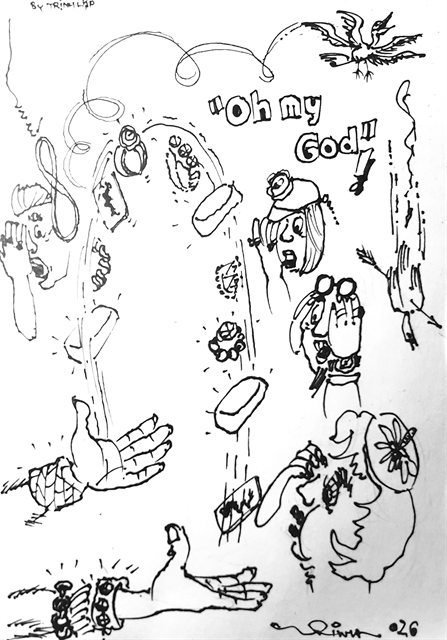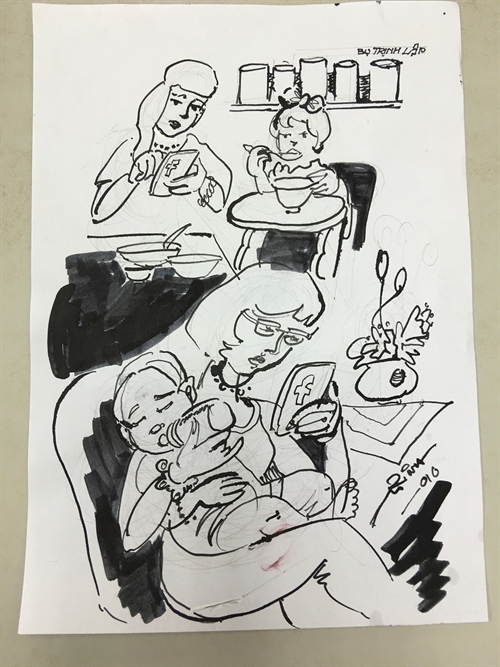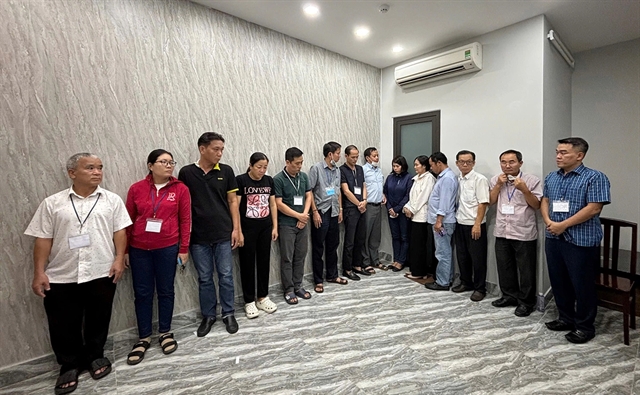 Talk Around Town
Talk Around Town

As an expectant mother, I read numerous books about childcare, but when my son was born, my brain either went blank or the facts just did not add up.
 |
by Minh Thu
As an expectant mother, I read numerous books about childcare, but when my son was born, my brain either went blank or the facts just did not add up.
Everything I knew about him amounted to nothing.
I was so puzzled and started joining social networks where mothers exchanged information and experiences. Whenever I had a trouble, I almost always found others who had been in a similar situation. They shared the perplexing feelings that a first-time mother faced and gave me advice.
First, I joined Betibuti, a Facebook group comprising breast-feeding mothers. When my son became a toddler, I moved from Betibuti to groups on weaning, early education with the Glenn Doman and Montessori methods, playing with children and how to deal with infant crises.
I realised that I was moving from one group to another. And I was not the only one. We, mothers, are raising our babies in the era of social networks.
Betibuti was founded in 2013 by Lê Nhất Phương Hồng, a breast feeding expert from the International Institute of Human Lactation Inc. in Canada, and the Regional Breast feeding Advocacy and Practice Course in Malaysia. Now, the group has 160,000 members.
As many as 98 per cent of mothers can feed babies their own milk, but the fact is that only 19.6 per cent of under-six-month-old babies are fed by breast milk, according to statistics from the National Nutrition Institute in 2013.
That is why Hồng established the social network to get mothers involved. She wanted to know why so many women refused to breast feed their babies? What were their difficulties? She also wanted to share their knowledge about breast feeding.
“When I connected to mothers on the social network, I realised that there were so many reasons for a mother not breast feeding her baby,” Hồng said.
”She was not aware of the importance of breast milk. She was convinced by advertisements, family members and other mothers that powdered milk was better than breast milk. One mother told me that her body did not produce enough milk to feed her baby.”
Thanks to the social network, Hồng found numerous mistakes that mothers were making, for example, eating pig’s feet as a galactagogic (lactation inducing) food.
“Mothers in other countries don’t eat pig’s feet to produce more milk,” Hồng said.
Hồng patiently listened to mothers and answered their questions every day. She shared with them her knowledge about breast feeding. Gradually, she persuaded many mothers to breast feed their babies, instead of giving them powdered milk.
“The social network is a place where mothers can find information and documents about breast feeding,” Hồng said. “Above all, they share real-life experiences, help each other to solve their problems and encourage each other to breast feed their babies.”
“Breast milk contains valuable antibodies that help prevent diseases and may reduce the risk of your baby developing allergies. No kind of formula milk can replace that,” Hồng said.
Through the Betibuti group, many mothers received scientific knowledge about feeding their babies. They enthusiastically joined in Hồng’s work to encourage others to breast feed their babies.
Recently, Hồng released a book, pointing out 68 mistakes in breast feeding and suggesting solutions to solve these problems.
“What I share on Facebook has helped many mothers to be aware of the importance of breast feeding, but I want the knowledge to reach more and more women who do not have a chance to join the social network, as well as fathers and grandparents who could join hands in the breast feeding revolution.”
Hồng is not the only author who is successfully sharing their knowledge via social networks. Dương Mai Trang and Vũ Thị Thu Hằng are founders of a group called, “It’s Time to Play” where they share their own experiences of playing with children and teaching them through games.
Thousands of people have "liked" and "followed" the page. They have remarked that thanks to this community, they have received many suggestions about how to play with children in a scientific and effective way, which previously they believed was simple and that there was nothing new to learn.
The two authors released a book also called “It’s Time to Play” to the group to introduce games and toys that parents can make with their children. They aim to improve the value of play time between children and parents.
Paediatrician Nguyễn Trí Đoàn from Victoria Healthcare in HCM City has 25 years of experience in childcare. He and his co-author Uyên Bùi have published a book entitled, “Để Con Được Ốm” (Let Your Child Be Sick), in which they share information and methods to take care of children when they are sick.
“Many parents quickly let their children consume antibiotics, but they don’t know that children’s bodies should learn to fight diseases by themselves,” Đoàn said. “Children’s bodies produce antibodies to protect themselves from diseases in the future.”
Several years ago, he set up a Facebook page to answer the queries of parents with regard to childcare, especially when their children are ill.
“I receive many questions every day,” he said.
“From my own experience and specific knowledge, I share with them the best way to take care of children scientifically,” he said.
He has received messages from so many people that the page has grown to become a huge community of parents.
“Medicine has always developed in a way that allows us to learn many things. Sometimes, members of my group consult with references in foreign languages. They translate and share the information with others. We all aim to do the best for children.”
Trần Thái Uyên from HCM City said she had joined many social networks and had consulted with many sources of information to take care of her daughter.
“We should think carefully with the aim of not drowning in a sea of information as there are many differing opinions,” she said.
“Since I’ve known about Dr Đoàn, I have followed his page and asked him when I am confused. As a paediatrician, Đoàn always gives me the right advice, and I believe in him.”
According to Psychologist Trần Thành Nam books on childcare abound in bookshops, but those written by Vietnamese authors who are administrators of social networks are best-sellers because readers find information that is similar to their own situations and the books’ content is based on real life conditions in Việt Nam.
“The development of social networks equips parents with knowledge to raise their children, so we cannot deny the role of communities on Facebook,” Nam said.
“However, I always remind Facebook users that they should filter information to follow scientific knowledge and choose what is most suitable for their condition. Each child is a separate entity, so don’t expect his or her growth to match that of a neighbour’s child.” – VNS




